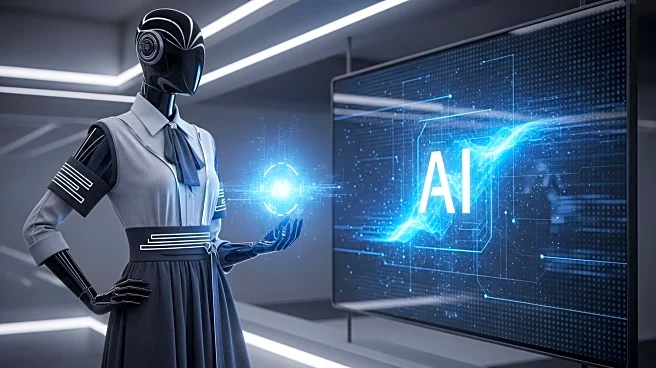What's Happening?
First Lady Melania Trump announced the 'Presidential AI Challenge' aimed at K-12 students, encouraging them to develop AI-based solutions for community challenges. In a video message, she wore a navy Michael Kors blazer and a white Gap T-shirt, symbolizing a blend of high fashion and accessibility. The initiative seeks to foster interest and competency in AI among young students, preparing them for future technological advancements. Melania Trump highlighted her involvement in AI through her audiobook and advocacy for online safety legislation. The challenge is part of a broader effort to position the U.S. as a leader in AI innovation.
Why It's Important?
The 'Presidential AI Challenge' represents a significant step in integrating AI education into the U.S. school system, potentially shaping the future workforce. By engaging students early, the initiative aims to demystify AI technology and inspire innovation, which could lead to economic growth and scientific advancements. The challenge underscores the importance of preparing the next generation for an AI-driven economy, ensuring the U.S. remains competitive globally. It also reflects Melania Trump's influence in promoting educational and technological initiatives, leveraging her platform to impact public policy.
What's Next?
The challenge invites students and educators to collaborate on AI projects, with guidance provided to foster creativity and innovation. As the initiative unfolds, it may prompt further educational reforms and investments in AI resources. Stakeholders, including educators and policymakers, are likely to monitor the program's impact on student engagement and learning outcomes. Success in this challenge could lead to expanded AI curricula and increased funding for technology education, reinforcing the U.S.'s commitment to leading in AI development.
Beyond the Headlines
The initiative highlights the role of first ladies in influencing public policy through soft diplomacy. Melania Trump's involvement in AI and online safety legislation demonstrates her ability to shape discussions on technology and education. The challenge also reflects broader cultural shifts towards embracing AI as a critical component of future societal development. As AI becomes more integrated into daily life, ethical considerations and the need for responsible innovation will become increasingly important.










